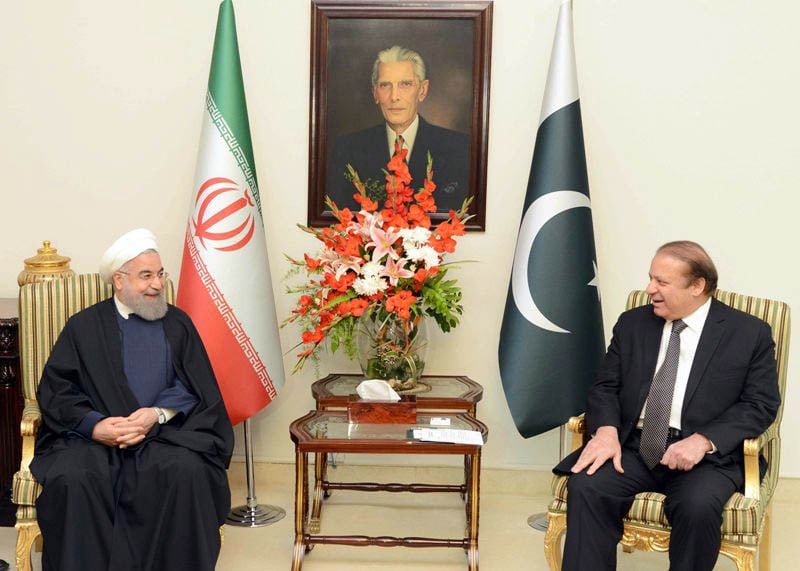
Pakistan’s agenda seems to be centred on economic growth and development with Iran which entails strengthening old alliances and building new partnerships

The Iranian President Hassan Rouhani’s Pakistan visit has breathed a new life into Pakistan-Iran relations after the turbulent 1990s. The visit is important today because it marks the beginning of a new chapter wherein Iran is no longer an international pariah.
With the US-Iran nuclear deal in place and sanctions lifted off, Iran is rising. The visit comes three years after Rouhani assumed power and after Prime Minister Nawaz Sharif visited the brotherly state twice.
Rouhani’s maiden visit to Pakistan with a 60-member delegation of businessmen that resulted in the signing of 6 MoUs on enhancing bilateral cooperation too echoed the same realisation that is pushing countries that have struggled with differences together -- the welfare and security of states is both "intertwined" and "interdependent".
With Iran being a neighbouring country, the stakes are much higher. Forging strong economic ties with Iran now that it is sanction-free and on the ascent binds economic interests together, and further compels both states to seek cooperation in other avenues of mutual interest as well. The Pakistan-Iran relationship will go much beyond just developing stronger economic ties, completing the IP gas pipeline, and increasing bilateral trade to $5billion in the next 5 years.
Seeking cooperation in fighting extremism and terrorism, convergence in the Afghan policy, and making collaborative efforts to improve border security are all areas that both states will be working on.
With respect to the Afghanistan question, which has for long been a reason for bad blood between Pakistan and Iran, it is a good omen for regional stability and cooperation that Iran has agreed to engage in trilateral talks with Pakistan and Afghanistan. It can be said that the mood is significantly different -- the fact that Rouhani chose to visit Pakistan, and not India, for his first visit to the region can perhaps be taken as a sign that the tide is shifting.
This is not to say that Pakistan and Iran’s nascent resolve for convergence overrides a history of good relations with India. Instead, it can be seen as a realisation of certain geo-economic and political realities. The same can be said about Chinese Premier Xi Jinping’s 2014 visit to India, which included the signing of 12 agreements in Delhi, one of which will see China investing $20bn in India’s infrastructure over a period of five years.
Whether things conceived on paper will materialise only time will tell but the point is that countries today are looking to build strategic partnerships with a view that any logjams in their relationships would eventually be resolved by engagement in the economic realm.
Pakistan’s longstanding brotherly relations with Saudi Arabia also form an interesting part of the equation. Pakistan seems to be trying to manoeuver through the Iran-Saudi turf war on the diplomatic front somehow. When the decision to not go to war in Yemen was made, it surprised many. However, just before Rouhani’s visit, Pakistan also became a member of the 34-member military alliance against terrorism led by Saudi Arabia. The move was heavily criticised by the Iranian ambassador to Pakistan who stated that not only was the alliance anti-Shia but just plain ridiculous.
With Iran reaching out to Turkey after years of a relationship marked by mutual mistrust and suspicion, we can see that the region as a whole is in a state of transition. Pakistan too, has shown a change in priorities which is obvious in its dynamics with Saudi Arabia today. It seems to be conscious of the fact that the only way out of its present troubled state is engaging with neighbours in the region and finding some common ground.
It is yet to be seen if this realisation is translated into action. But such changes can only become obvious in retrospect and progress may be slow and marked with hiccups on the way. During Rouhani’s short stay in Pakistan, there was already one -- the arrest of an alleged Indian spy in Balochistan who apparently had an Indian passport with an Iranian visa stamp on it has also sparked a great deal of controversy.
Pakistan’s army chief Gen Raheel Sharif is reported to have discussed the matter with Iranian President Hassan Rouhani. However, the latter denied this at a press conference. Following this, the ISPR shared Gen Sharif’s remarks.
"There is one concern that RAW is involved in Pakistan, especially in Balochistan, and sometimes it also uses the soil of our brother country Iran. I request, they should be told to stop these activities and allow Pakistan to achieve stability."
It is yet to be seen what comes out of this entire episode but it can be safely assumed that this will not be the last of the challenges that will test mutual trust.
Pakistan’s unease also stems from India’s interest in developing Chabahar Port in Iran which is quite close to the Gwadar Port in Pakistan. However, it can be said that the surge of resolve for regional cooperation and engagement might be instrumental in keeping the competing interests of regional players in check.
As of now, Pakistan’s agenda seems to be centred on economic growth and development which entails strengthening old alliances and building new partnerships, which is largely in sync with global developments. This puts the country in a better position to benefit from economic integration and globalisation. History has warned us against the folly of putting all our eggs in one basket.